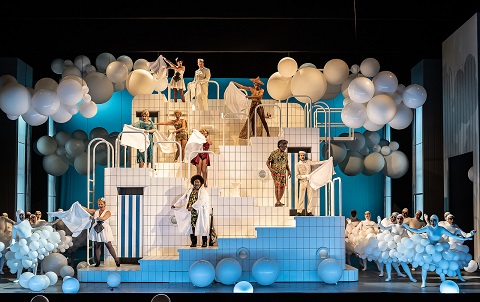
13 Oct 2019
A humourless hike to Hades: Offenbach's Orpheus in the Underworld at ENO
Q. “Is there an art form you don't relate to?” A. “Opera. It's a dreadful sound - it just doesn't sound like the human voice.”
English Touring Opera are delighted to announce a season of lyric monodramas to tour nationally from October to December. The season features music for solo singer and piano by Argento, Britten, Tippett and Shostakovich with a bold and inventive approach to making opera during social distancing.
This tenth of ten Live from London concerts was in fact a recorded live performance from California. It was no less enjoyable for that, and it was also uplifting to learn that this wasn’t in fact the ‘last’ LfL event that we will be able to enjoy, courtesy of VOCES8 and their fellow vocal ensembles (more below …).
Ever since Wigmore Hall announced their superb series of autumn concerts, all streamed live and available free of charge, I’d been looking forward to this song recital by Ian Bostridge and Imogen Cooper.
The Sixteen continues its exploration of Henry Purcell’s Welcome Songs for Charles II. As with Robert King’s pioneering Purcell series begun over thirty years ago for Hyperion, Harry Christophers is recording two Welcome Songs per disc.
Although Stile Antico’s programme article for their Live from London recital introduced their selection from the many treasures of the English Renaissance in the context of the theological debates and upheavals of the Tudor and Elizabethan years, their performance was more evocative of private chamber music than of public liturgy.
In February this year, Albanian soprano Ermonela Jaho made a highly lauded debut recital at Wigmore Hall - a concert which both celebrated Opera Rara’s 50th anniversary and honoured the career of the Italian soprano Rosina Storchio (1872-1945), the star of verismo who created the title roles in Leoncavallo’s La bohème and Zazà, Mascagni’s Lodoletta and Puccini’s Madama Butterfly.
Evidently, face masks don’t stifle appreciative “Bravo!”s. And, reducing audience numbers doesn’t lower the volume of such acclamations. For, the audience at Wigmore Hall gave soprano Elizabeth Llewellyn and pianist Simon Lepper a greatly deserved warm reception and hearty response following this lunchtime recital of late-Romantic song.
Collapsology. Or, perhaps we should use the French word ‘Collapsologie’ because this is a transdisciplinary idea pretty much advocated by a series of French theorists - and apparently, mostly French theorists. It in essence focuses on the imminent collapse of modern society and all its layers - a series of escalating crises on a global scale: environmental, economic, geopolitical, governmental; the list is extensive.
For this week’s Live from London vocal recital we moved from the home of VOCES8, St Anne and St Agnes in the City of London, to Kings Place, where The Sixteen - who have been associate artists at the venue for some time - presented a programme of music and words bound together by the theme of ‘reflection’.
'Such is your divine Disposation that both you excellently understand, and royally entertaine the Exercise of Musicke.’
Amongst an avalanche of new Mahler recordings appearing at the moment (Das Lied von der Erde seems to be the most favoured, with three) this 1991 Mahler Second from the 2nd Kassel MahlerFest is one of the more interesting releases.
‘And there was war in heaven: Michael and his angels fought against the dragon; and the dragon fought and his angels, And prevailed not; neither was their place found any more in heaven … that old serpent … Satan, which deceiveth the whole world: he was cast out into the earth, and his angels were cast out with him.’
If there is one myth, it seems believed by some people today, that probably needs shattering it is that post-war recordings or performances of Wagner operas were always of exceptional quality. This 1949 Hamburg Tristan und Isolde is one of those recordings - though quite who is to blame for its many problems takes quite some unearthing.
There was never any doubt that the fifth of the twelve Met Stars Live in Concert broadcasts was going to be a palpably intense and vivid event, as well as a musically stunning and theatrically enervating experience.
‘Love’ was the theme for this Live from London performance by Apollo5. Given the complexity and diversity of that human emotion, and Apollo5’s reputation for versatility and diverse repertoire, ranging from Renaissance choral music to jazz, from contemporary classical works to popular song, it was no surprise that their programme spanned 500 years and several musical styles.
The Academy of St Martin in the Fields have titled their autumn series of eight concerts - which are taking place at 5pm and 7.30pm on two Saturdays each month at their home venue in Trafalgar Square, and being filmed for streaming the following Thursday - ‘re:connect’.
The London Symphony Orchestra opened their Autumn 2020 season with a homage to Oliver Knussen, who died at the age of 66 in July 2018. The programme traced a national musical lineage through the twentieth century, from Britten to Knussen, on to Mark-Anthony Turnage, and entwining the LSO and Rattle too.
With the Live from London digital vocal festival entering the second half of the series, the festival’s host, VOCES8, returned to their home at St Annes and St Agnes in the City of London to present a sequence of ‘Choral Dances’ - vocal music inspired by dance, embracing diverse genres from the Renaissance madrigal to swing jazz.
Just a few unison string wriggles from the opening of Mozart’s overture to Le nozze di Figaro are enough to make any opera-lover perch on the edge of their seat, in excited anticipation of the drama in music to come, so there could be no other curtain-raiser for this Gala Concert at the Royal Opera House, the latest instalment from ‘their House’ to ‘our houses’.
"Before the ending of the day, creator of all things, we pray that, with your accustomed mercy, you may watch over us."

Q. “Is there an art form you don't relate to?” A. “Opera. It's a dreadful sound - it just doesn't sound like the human voice.”
My preparatory research in advance of Emma Rice’s new production of Offenbach’s Orpheus in the Underworld at English National Opera was inauspicious. Her dismissal of opera as an artform, in an interview in The Guardian in 2012, together with her recent remark to the newspaper’s associate editor (culture) Claire Armitstead that after agreeing to take on the production she found herself thinking, “‘Bloody hell, how do I get through this?’ It would be easier if I knew how to read a score”, didn’t inspire confidence.
Pre-performance, a programme article informed me that Rice’s starting point for re-writing the spoken text of the libretto - the new English lyrics have been supplied by Tom Morris - had been to put the French text through Google Translate and that, as she chopped and changed the opera, particularly Act 2, ENO’s Artistic Director Daniel Kramer had had to remind her, “let’s get the music back in. We are an opera house!” Returning to the score Rice seems to have been quite surprised to find that “yes, there was all this lovely music I’d left out so back it went in and I cut a lot of the text I’d written”. Not enough of the latter, was my post-performance assessment.
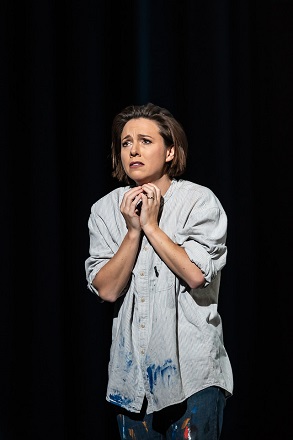 Mary Bevan (Euridice). Photo credit: Clive Barda.
Mary Bevan (Euridice). Photo credit: Clive Barda.
Rice seems to have taken the fact that Offenbach didn’t leave us a definitive score as evidence of a schism in the Werktreue pact between composer and performer, and as licence to act as co-creator and ‘rectifier’. “I started to look at the two-act and the four-act versions and at the three English translations of the libretto that I found. None of them said what I wanted to say.” What about what Offenbach wanted to say?
Rice is probably not inaccurate to observe that “A lot of the satirical nineteenth-century French jokes just don’t work”. Nowadays, Offenbach’s mockery of myths and Gods, and of Gluck’s presentation of them, is unlikely to prompt either a giggle or the disgruntled self-righteousness of the critic, following the 1858 premiere at the Bouffes-Parisiens, who condemned the operetta as a ‘'profanation of holy and glorious antiquity’. And, while Flaubert had been prosecuted for obscenity in 1856 for his daring depiction of the adulterous Emma Bovary, marital discord and infidelity no longer raise eyebrows.
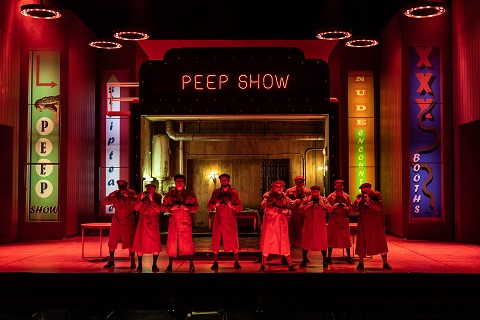 Photo credit: Clive Barda.
Photo credit: Clive Barda.
But, what Offenbach really had in his sights was the Second Empire elite and his operetta’s revolutionary energy derives from its lampooning of the veneer of glamour and wealth which masked corruption and authoritarianism. A satire on pompous politicians and their vices surely has some contemporary relevance? After all, Act 2 ends with the gods’ declaration that their ‘strong’ leader is taking them all down to hell. Quite.
Rice seems to have decided otherwise. I was interested to read a comment by the Spectator’s Kate Maltby, written in October 2016 following Rice’s departure from her position as Artistic Director of the Globe Theatre: ‘Rice seemed to view Shakespeare’s texts as obstacles to be avoided, rather than challenges to be solved. […] Why probe a Jacobean playwright’s blindspots if you can just rewrite them?’ Plus ça change …
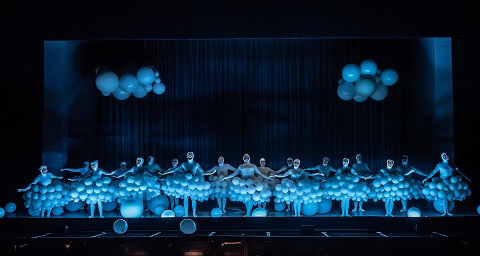 Photo credit: Clive Barda.
Photo credit: Clive Barda.
Don’t be misled by the balloons. Courtesy of the valiant ENO Chorus we have balloon bees, balloon sheep, balloon tutus, balloon clouds, even a taxi borne aloft by balloons, but, set in Soho in the 1950s, Rice’s production is no party. During the overture she presents a ‘pre-story’ which sees the genuinely enamoured Orpheus (Ed Lyon) and Euridice (Mary Bevan) wed, conceive a child and then suffer a tragedy which results in marital breakdown. A wreath spelling BABY casts a depressing and not entirely tasteful shadow on proceedings.
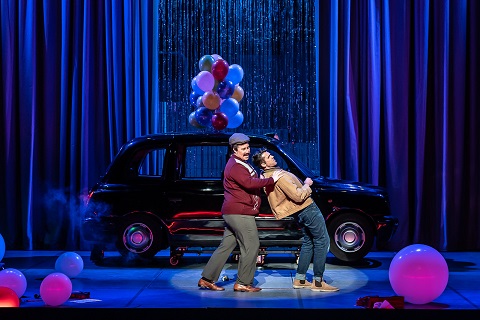 Lucia Lucas (Public Opinion) and Ed Lyon (Orpheus). Photo credit: Clive Barda.
Lucia Lucas (Public Opinion) and Ed Lyon (Orpheus). Photo credit: Clive Barda.
The traumatised Euridice runs off with ‘shepherd’ Aristaeus (Alex Otterburn’s Pluto in disguise) and Public Opinion (Lucia Lucas) - a London cabbie who has ‘The Knowledge’ - persuades Orpheus to hop into his TX4 and head for Hades to win her back. First, though, we stop off in Olympus, a luxury lido where the gods are bored and behaving badly. Ambrosia and amorous adventures are no longer gratifying, and Jupiter is a sexual predator. When the Hackney cab rolls up in Hell, we find Euridice imprisoned in a hovel, the horrors of which are exacerbated by her inebriate gaoler, John Styx (Alan Ope is brilliantly sinister but it’s not clear why he laments his lost kingship of Poland, rather than Boeotia?).
Forced to work in a sleazy Peep Show, Euridice is leered at by dirty old men-in-macs and a beer-bellied Bacchus (the ENO Chorus’s Peter Willcock). Where Offenbach’s score gives us the sparkle of life-affirming laughter, Rice gives us misogyny and #MeToo sexual abuse. Euridice sings: “Dance! Till you feel your soul goes. Dance until control goes and you can’t ask why. Embrace the frenzy and the pain until the mad becomes the sane.” Infernal it certainly is, but not the time and place for a can-can.
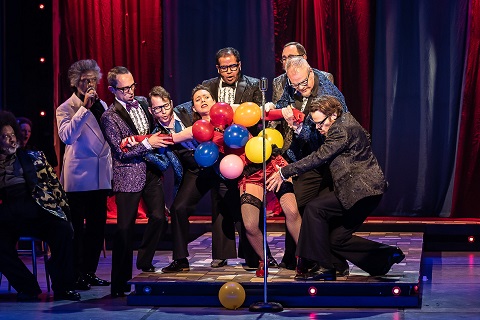 Photo credit: Clive Barda.
Photo credit: Clive Barda.
Rice declares, “if I do one thing I will make people care about [Orpheus and Euridice]”; it might have been better if she’d made us laugh. Even our London cabbie’s humour fails, though Lucas does her best with the ponderous dialogue. And, if we do care, then it’s because Lyon and Bevan, and the rest of the strong cast, sing with courage and commitment, not because of Rice’s meddling.
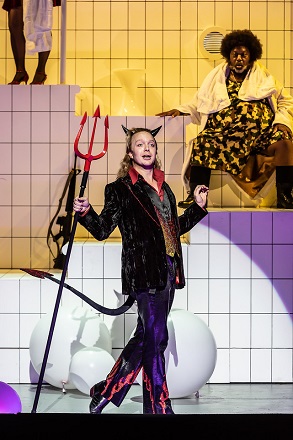 Alex Otterburn (Pluto). Photo credit: Clive Barda.
Alex Otterburn (Pluto). Photo credit: Clive Barda.
Bevan’s beautiful warm soprano gives some weight to Rice’s conception of Euridice as a woman wronged, and Lyon is a sympathetic Orpheus in contrast to the slimy sleaze-balls who plague his beloved. Alex Otterburn’s campy Pluto flicks his forked tail with aplomb and delivers an agile performance. Ellie Laugharne looks and sounds good as the gold-lame hot-pant wearing Cupid, though her words evaded me, and Idunnu Münch sings Diana’s decidedly unchaste aria superbly. Judith Howarth (Venus) and Anne-Marie Owens (Juno) are strong vocally but under-directed, though the latter gives a masterclass in how to declaim the spoken dialogue. Keel Watson dons a medal-decorated white bathing-gown over his combat fatigues as the bellicose Mars. Dressed in Bermuda shorts and drawing on a cigar, Willard White sings resonantly but is a rather stern and disengaged Jupiter; perhaps he was disaffected by having to sing lines such as “When I wiggle my bum, my little wings begin to hum” in the fly-duet.
Lizzie Clachan’s set and Lez Brotherston’s costumes are eye-pleasing and colourfully lit by Malcolm Rippeth. In the pit, Sian Edwards does her best to serve up some sparkle, but the stop-starts caused by the dull (amplified) dialogue take the edge of the dramatic pace. Glitter and be gay this Orpheus is not. By the end, the balloons had well and truly burst.
Claire Seymour
Eurydice - Mary Bevan. Orpheus - Ed Lyon, Public Opinion - Lucia Lucas, Pluto- Alex Otterburn, Jupiter - Willard White, Juno - Anne-Marie Owens, Cupid - Ellie Laugharne, Diana - Idunnu Münch, Venus - Judith Howarth, Mars - Keel Watson, John Styx - Alan Oke; Director - Emma Rice, Conductor -Sian Edwards, Set Designer - Lizzie Clachan, Costume Designer - Lez Brotherston, Lighting Designer - Malcolm Rippeth, Choreographer - Etta Murfitt, Sound Designer - Simon Baker, Orchestra and Chorus of English National Opera.
English National Opera, London Coliseum; Friday 11th October 2019.